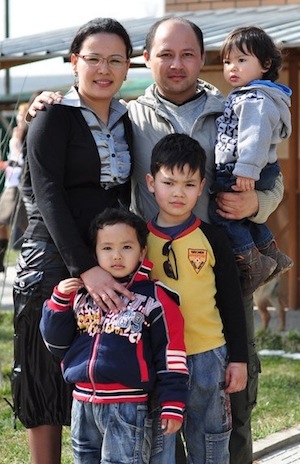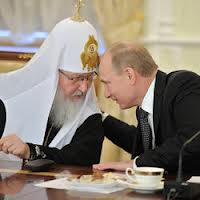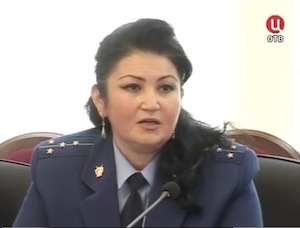American Pastor Detained in Russia
 Wednesday, February 27, 2013 at 09:20AM
Wednesday, February 27, 2013 at 09:20AM Anatoly Pchelintsev, lawyer,
Co-Chairmain of the Slavic Center for Law and Justice
 Russia,
Russia,  Thomas Kang,
Thomas Kang,  Tula
Tula  Wednesday, February 27, 2013 at 09:20AM
Wednesday, February 27, 2013 at 09:20AM Anatoly Pchelintsev, lawyer,
Co-Chairmain of the Slavic Center for Law and Justice
 Russia,
Russia,  Thomas Kang,
Thomas Kang,  Tula
Tula  Friday, December 7, 2012 at 11:30AM
Friday, December 7, 2012 at 11:30AM  Three months after he was detained on an extradition request from Uzbekistan, Protestant pastor Makset Djabbarbergenov was suddenly released from prison in Kazakhstan's commercial capital Almaty on 4 December and put on a flight out of the country in the early hours of 5 December. He, his wife and four children arrived safely in Frankfurt airport this morning and travelled on to a third country in Europe, Forum 18 News Service has learnt. Although border guards at Almaty airport told Djabbarbergenov as he left that he was banned from re-entering Kazakhstan until 2017, his friends in the city told Forum 18 "we need to thank the Kazakh government – they did the right thing".
Three months after he was detained on an extradition request from Uzbekistan, Protestant pastor Makset Djabbarbergenov was suddenly released from prison in Kazakhstan's commercial capital Almaty on 4 December and put on a flight out of the country in the early hours of 5 December. He, his wife and four children arrived safely in Frankfurt airport this morning and travelled on to a third country in Europe, Forum 18 News Service has learnt. Although border guards at Almaty airport told Djabbarbergenov as he left that he was banned from re-entering Kazakhstan until 2017, his friends in the city told Forum 18 "we need to thank the Kazakh government – they did the right thing".
His release was possible because of the massive international pressure and pleas to government of Kazakhstan on many levels. Russian Ministries thanks all who had prayed, sent letters, spread the information and did their best to bring closer the day when pastor Makset joined his family.
Djabbarbergenov had led a Pentecostal community in his home town of Nukus, the capital of Uzbekistan's autonomous republic of Karakalpakstan [Qoraqalpoghiston], from 2001. He had been fined for his religious activity and had his home raided and Christian books confiscated.
He fled in August 2007 after anti-terrorism police raided his home, claiming he was holding an "illegal" religious meeting. Police detained him, but did not prevent him leaving the police station several hours later to attend to his distressed wife Aigul, who was seven months pregnant.
Soon afterwards, Djabbarbergenov left Nukus for the Uzbek capital Tashkent. On 20 August 2007, Nukus police issued a wanted poster (seen by Forum 18) stating that he was a follower of Isa Masih (Jesus Christ) and was being sought to face charges under Criminal Code Article 229-2. Police confirmed to Forum 18 from Nukus in October 2007 that they were still hunting for Djabbarbergenov (see F18News 12 October 2007 http://www.forum18.org/Archive.php?article_id=1034).
To evade arrest, Djabbarbergenov crossed into Kazakhstan on 11 September 2007, where he sought refugee status with the UNHCR. His wife and children joined him in 2008.
 Wednesday, November 28, 2012 at 10:05PM
Wednesday, November 28, 2012 at 10:05PM  President Vladimir Putin has decided to postpone the adoption of legislation criminalizing blasphemy and acts that offend religious believers until spring, a news report said Wednesday.
President Vladimir Putin has decided to postpone the adoption of legislation criminalizing blasphemy and acts that offend religious believers until spring, a news report said Wednesday.
In the meantime, authorities hope to engage the public in a serious discussion on the contentious legislation, which would impose maximum penalties of three years' imprisonment, a 300,000 ruble ($10,000) fine or 200 hours' community work for publicly offending believers' feelings, a Kremlin source told Vedomosti.
At a meeting of Putin's human rights council earlier this month, prominent activists criticized the blasphemy bill for its vague wording, which they said could result in miscarriages of justice. "'Feeling' is vague term, not a legal one," liberal politician Irina Khakamada told Putin at the meeting.
Her words were echoed by the Supreme Court, which said in a written assessment of the legislation that its implementation would be difficult unless phrases like "worship" and "religious traditions and ceremonies" were clarified, according to Vedomosti.
Those in favor of the bill argue that raising penalties for blasphemy is necessary to stamp out growing conflict in the sphere of religion
Read more:http://www.themoscowtimes.com/news/article/legislation-criminalizing-blasphemy-frozen-until-spring/472111.html#ixzz2DZr6G3V7
The Moscow Times
 Wednesday, November 28, 2012 at 10:23AM
Wednesday, November 28, 2012 at 10:23AM |
Members of Minsk's New Life Pentecostal Church – who have been campaigning for a decade to hold on to their building - have been ordered to hand over the keys of their church to officials next Wednesday (5 December). The eviction order – seen by Forum 18 News Service - orders the local housing authority to provide "vehicles, manpower and everything necessary to evict the debtor" in case of forced eviction. Court executor Olga Shcherbovich of Minsk's Higher Economic Court, who signed the order, refused to discuss it with Forum 18. "We are treating this very seriously," church member and lawyer Sergei Lukanin told Forum 18. "There will be round-the-clock prayer in our building and special evening prayer meetings to ask the Lord to defend our building and to guide our response to the authorities. |
|
Yesterday (27 November) New Life Pentecostal Church received notice that it must voluntarily vacate its building by 5 December or else be forcibly evicted. "We are treating this very seriously," Sergei Lukanin, New Life member and lawyer, remarked to Forum 18 News Service from the Belarusian capital Minsk on 28 November. "There will be round-the-clock prayer in our building and special evening prayer meetings to ask the Lord to defend our building and to guide our response to the authorities." |
 Monday, November 26, 2012 at 01:47PM
Monday, November 26, 2012 at 01:47PM  On November 9, 2012, the campaign to destroy the rehabilitation center New Life in Petersburg, Russia, passed to an active phase.
On November 9, 2012, the campaign to destroy the rehabilitation center New Life in Petersburg, Russia, passed to an active phase.
New Life was created in 1995 and is now the biggest and most effective rehabilitation center for drug- and alcohol-addicted people in Russia. There are 360 people going through rehabilitation at any given time. Research by the Russian Department of Health showed a success rate of 59.2 %. The center has received numerous certificates of honor, letters of thanks, and awards.
All of these achievements have been built on private donations and other funds raised by the center itself—they receive no funding from the Russian government.
Despite its success and positive impact on the community, for several years the Russian authorities have been attacking “New Life.”
The professed cause of these attacks is “violation of economic activity and human rights.” However, the true cause is the fact that New Life is located on a piece of real estate which has suddenly risen in value, a zone next to the Ust-Luga seaport coveted by some business organizations. “We know exactly who ordered the attacks and which corrupt officials have carried them out. The raids are acts of intimidation and attempts to find a way to discredit the center, then use it for the criminal prosecution of the center’s management,” says New Life founder Sergey Matevosyan.
Representatives of the prosecutor’s office of Leningradskaya Oblast repeatedly emphasized New Life’s connection with the Protestant church, calling it a sect and accusing the staff of “suppression of will of rehabilitants,” entirely without proof.
In the last few weeks, the center has been raided by the local police, the regional prosecutor's office, the regional FSB, the fire department, and the labor and sanitary inspectors. Even trained dogs were brought to find “hidden drugs” which, of course, didn’t exist. Nevertheless, Mr. Matevosyan expects to receive huge penalties. As he explains, “They weren’t able to intimidate us, they didn’t find anything, but now there will be penalties of ten of thousands of dollars for items like a fire extinguisher located in the wrong corner of a room.”
To be a Protestant in modern Russia is to be outside the law. You can be plundered and fined, your building can be destroyed (as was recently the case with Holy Trinity Church in Moscow), and authorities can fabricate a criminal case against you. All of this is done with impunity because only three major religions are protected—Eastern Orthodox Christianity, Judaism, and the Sunni sect of Islam. All others are left without the protection of the state, as the current case demonstrates.
The video consist of introduction of a New Life Center, the footages from the Center during attack, and the statements from the persecutors office
Raids on New Life Center from Wade on Vimeo.